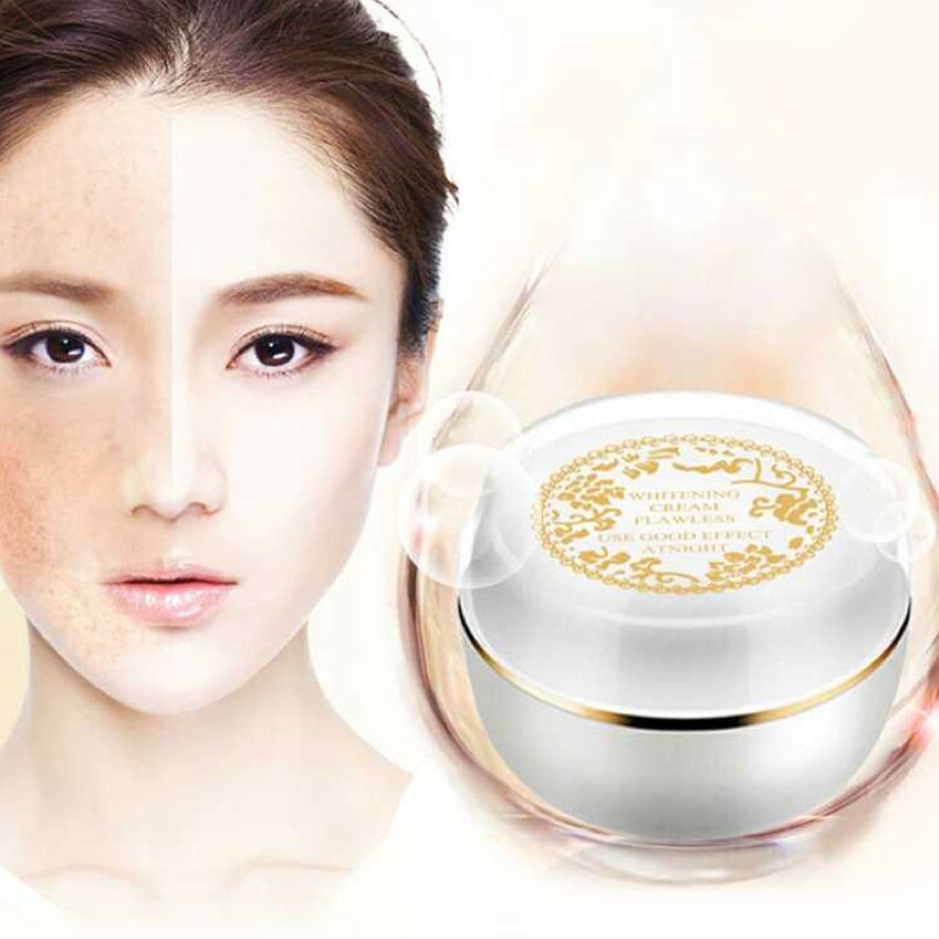People have experimented with a vast array of skincare products and procedures in their quest for beauty and glowing skin. Whitening creams have been more popular than other products since they promise to help people obtain a fairer, brighter complexion. However, what precisely are whitening creams, how do they function, and are they secure? In this thorough guide, we’ll delve into the realm of whitening creams and examine their workings, components, advantages, and potential drawbacks.
Knowledge about Whitening Creams
Skin-lightening, brightening, or whitening creams are cosmetic items made to address problems with skin pigmentation, uneven tone, and black spots.
They come in a variety of formulas to accommodate diverse skin types and issues. These creams’ main objectives are to produce a more even and radiant complexion by preventing the generation of melanin, the pigment that gives skin its color.
How Do Whitening Creams Function?
Combinations of mechanisms that focus on melanin distribution and generation in the skin are used by whitening creams to operate. The following are the main ways that these creams work:
Tyrosinase Enzyme Inhibition
Tyrosinase is an enzyme that controls the synthesis of melanin. Ingredients that suppress the action of this enzyme are frequently used in whitening treatments, which lowers melanin formation. Alpha arbutin, kojic acid, and hydroquinone are typical tyrosinase inhibitors.
Exfoliation
Exfoliating ingredients like beta hydroxy acids (BHAs) or alpha hydroxy acids (AHAs) are found in several whitening lotions. These components aid in the removal of dead skin cells from the skin’s surface, exposing younger-looking skin beneath. Exfoliating frequently might also aid in lightening dark patches.
Blocking the Transfer of Melanin
Melanin is transported to neighboring skin cells known as keratinocytes in addition to being created in melanocytes, the skin cells responsible for producing melanin. Some components in whitening creams interfere with this transfer process, preventing more melanin from penetrating the skin’s surface.
Decreased Inflammation
Post-inflammatory hyperpigmentation (PIH), which results in dark patches, can result from skin irritation. Niacinamide and other anti-inflammatory chemicals found in whitening products can aid in promoting even skin tone and lowering the risk of PIH.
Antioxidant Capability
Antioxidant-rich ingredients, such as vitamins C and E, can shield the skin from UV rays and oxidative stress, which can cause melanin development. They also support the overall health and brightness of the skin.
Ingredients Often Found in Whitening Creams
Whitening creams can contain a large variety of substances, each with special qualities and advantages. These are some of the regular constituents in these products:
One of the most popular skin-lightening treatments is hydroquinone, a potent tyrosinase inhibitor. Hyperpigmentation and dark patches can be efficiently lightened using it.
Kojic Acid
A further tyrosinase inhibitor that can help lighten dark spots and level out skin tone, kojic acid is derived from specific fungi.
Alpha Arbutin
A naturally occurring hydroquinone derivative, alpha arbutin is less harsh on the skin yet has a powerful melanin-reduction impact.
Ascorbic Acid
Ascorbic acid, often known as vitamin C, is a well-known antioxidant that can lighten dark spots and brighten the complexion. For younger-looking skin, it also increases collagen formation.
Niacinamide (Vitamin B3)
Niacinamide is an effective treatment for general skin health and tone because it not only lowers melanin synthesis but also enhances the skin’s barrier function.
Licorice Extract
This all-natural ingredient is gentle on sensitive skin because of its anti-inflammatory and skin-lightening effects.
Alpha Hydroxy Acids (AHAs)
By eliminating dead skin cells, AHAs like glycolic acid and lactic acid exfoliate the skin, providing a more radiant complexion.
Salicylic Acid
Salicylic acid is a typical BHA used in skincare. Beta Hydroxy Acids (BHAs). It works well to treat dark spots brought on by acne since it can enter the pores.
Advantages of Whitening Cream Use
Whitening creams have many advantages as they provide glowing and smoothness to skin and protect from anti-aging.
Decreased Hyperpigmentation
Nowadays hyperpigmentation can be a source of depression for women as well as men. It can remove dark spots and provide blush to the skin.
Better Skin Tone
By using whitening creams daily, your skin can be better.
Enhancing Skin Texture
It will provide smoothness to your skin, and enhance your skin texture.
Dealing with Acne Scars
Certain whitening creams can help fade scars or post-acne hyperpigmentation to promote clearer skin for people who have these conditions.
Avoiding Future Pigmentation Problems
Antioxidant-rich whitening products can help shield the skin from additional harm and pigmentation problems brought on by UV rays and other environmental causes.
Increased Self-Assurance
Having a complexion that is more even and radiant can increase self-esteem and general well-being.
Risks and Things to Consider
While there are many possible advantages to using whitening creams, there are also hazards and things to consider.
Skin Sensitivity
Some bleaching agents, such as hydroquinone and AHAs, can be harsh on the skin and cause rashes, dryness, or irritation. To reduce negative effects, it’s critical to start with lower concentrations and gradually increase consumption.
Sun Sensitivity
Skin can become more sensitive to UV rays after using whitening lotions. To stop future pigmentation problems, daily sun protection with broad-spectrum sunscreen is essential when using these products.
Transient Results
The effects of whitening creams may not be long-lasting and they produce gradual results. The ideal skin tone frequently requires continued use.
Considerations for Skin Type
For certain skin types, some components might be more appropriate. It’s crucial to select whitening products that are suitable for your skin type and problems.
A Dermatologist Consultation
If you are having very serious skin issues, you have to consult your dermatologist. They can give you recommendations related to the nature of your skin.
Conclusion
Whitening creams are crucial if you have skin issues. They have multiple advantages. They remove darkspots, malesma and hperpigmentation. Bright and glowing skin can be achieve hrough these creams.
It’s important to use caution when using whitening lotions, especially if you have sensitive skin or certain pigmentation issues. Before introducing a new product into your routine, always perform a patch test to see how your skin reacts.

